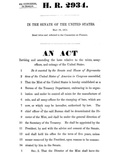Wikipedia:Today's featured article/requests/Coinage Act of 1873
Coinage Act of 1873[edit]
- This is the archived discussion of the TFAR nomination for the article below. Subsequent comments should be made on the appropriate discussion page (such as Wikipedia talk:Today's featured article/requests). Please do not modify this page.
The result was: scheduled for Wikipedia:Today's featured article/June 10, 2016 by — Chris Woodrich (talk) 04:19, 21 May 2016 (UTC)
The Coinage Act of 1873 abolished the right of holders of silver bullion to have their metal struck into fully legal tender dollar coins, thus ending bimetallism in the United States, and placing the nation firmly on the gold standard. By 1869, the Mint Act of 1837 was deemed outdated, and Treasury Secretary George Boutwell had Deputy Comptroller of the Currency John Jay Knox undertake a draft of a revised law, which was introduced into Congress by Ohio Senator John Sherman. Due to the high price of silver, little of that metal was presented at the Mint, but Knox and others foresaw that development of the Comstock Lode and other rich silver-mining areas would lower the price, causing large quantities of silver dollars to be struck and the gold standard to be endangered. During the almost three years the bill was pending before Congress, it was rarely mentioned that it would end bimetallism, though this was not concealed. Congressmen instead debated other provisions. The legislation, in addition to ending the production of the silver dollar, abolished three low-denomination coins. The bill became the Act of February 12, 1873, with the signature of President Ulysses S. Grant. When silver prices dropped in 1876, producers sought to have their bullion struck at the Mint, only to learn that this was no longer possible. The matter became a major political controversy that lasted the remainder of the century, pitting those who valued the deflationary gold standard against those who believed free coinage of silver to be necessary for economic prosperity. Accusations were made that the passage of the act had been secured through corruption, and because of this, the act was often denounced as the "Crime of '73". (Full article...)
- Most recent similar article(s):
- Main editors: Wehwalt
- Promoted: 2015
- Reasons for nomination:
- Support as nominator. Wehwalt (talk) 20:26, 11 May 2016 (UTC)
- Support Celebrate the end of bimetallism in the United States. Hawkeye7 (talk) 20:41, 15 May 2016 (UTC)

